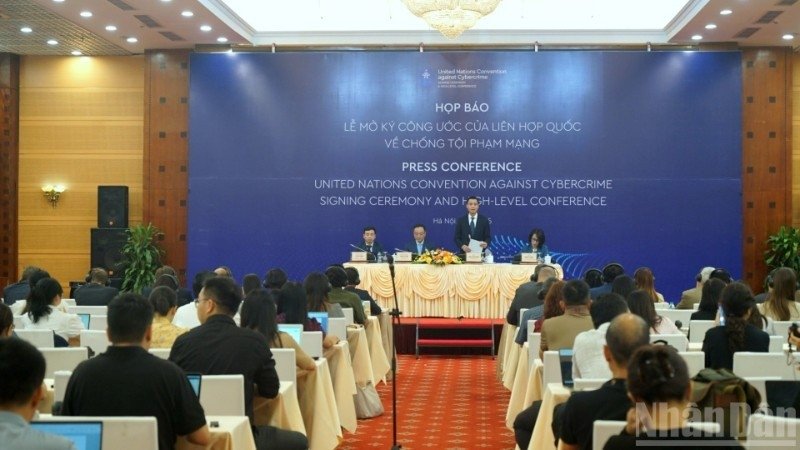HANOI: As cyberattacks multiply and digital economies face mounting threats, Vietnam will host the signing of the United Nations Convention against Cybercrime — the first international anti-crime treaty in two decades — cementing its growing role in global digital governance.
A Global Milestone Rooted in Hanoi
The signing ceremony of the UN Convention against Cybercrime, known as the Hanoi Convention, will take place in Vietnam’s capital on October 25–26, marking what UN officials describe as a “crucial step forward” in the international community’s efforts to combat online criminality.
The convention’s adoption, formally approved by the UN General Assembly on December 24, 2024, represents the first major multilateral anti-crime treaty since the 2000 Palermo Convention on transnational organized crime. It follows eight negotiation rounds and five intersessional meetings held between February 2022 and August 2024, culminating in the most comprehensive global legal framework yet established to counter cyber threats.
The two-day event in Hanoi will include eight high-level dialogues co-hosted by Vietnamese ministries and the UN Office on Drugs and Crime (UNODC), along with 38 expert workshops and over 20 exhibition booths exploring cyber governance, data protection, and cross-border cooperation.
Vietnam’s Expanding Role in Cyber Diplomacy
For Vietnam, the hosting of the Hanoi Convention underscores years of investment in cybersecurity governance and multilateral engagement. Deputy Minister of Foreign Affairs Đặng Hoàng Giang, who served as Vietnam’s Permanent Representative to the UN from 2022 to 2025, said the country had “actively and comprehensively” participated in every negotiation round under the mandate of the State President, coordinating efforts between the Ministry of Public Security and the Ministry of Foreign Affairs.
Vietnam’s delegation pushed for the inclusion of principles emphasizing national sovereignty, independence, and non-interference in internal affairs — ensuring the treaty balances international cooperation with domestic legal frameworks.
“Vietnam’s constructive contributions were widely recognized,” Giang said, noting that the final text reflects “a harmony between national interests and global standards.”
For UNODC Executive Director Ghada Waly, the convention’s adoption marks “a major victory for multilateralism,” and the first international legal instrument to address crimes such as online child sexual abuse, money laundering, and sophisticated digital scams in nearly twenty years.
FCRF Launches CCLP Program to Train India’s Next Generation of Cyber Law Practitioners
A Rising Tide of Cyber Threats
The treaty comes amid an alarming global escalation of cybercrime. According to UN estimates, the annual worldwide cost of cyberattacks now exceeds $8 trillion(₹7.06 lakh crores), with millions of incidents occurring every day. The FBI’s 2024 Internet Crime Report documented 859,532 complaints of suspected cyber offenses, totaling losses above $16 billion(₹14,032 crores) — a 33 percent increase over the previous year. In Europe, the EU Agency for Cybersecurity (ENISA) recorded more than 11,000 cyber incidents, including ransomware and DDoS attacks that disrupted hospitals, schools, and public infrastructure.
In Vietnam, officials say the threat has grown “increasingly complex in scale, nature, and impact.” Major General Lê Xuân Minh, Director of the Department of Cybersecurity and High-Tech Crime Prevention at the Ministry of Public Security, said that over 100,000 cyber-related incidents were recorded last year alone. Criminal operations, he added, are evolving from isolated attacks to well-organized, transnational networks targeting financial institutions and national systems.
This backdrop has fueled Hanoi’s call for multilateral cooperation, mutual legal assistance, and the sharing of electronic evidence across jurisdictions — central tenets of the new convention.
Building Legal and Technical Foundations
The Hanoi Convention comprises nine chapters and 71 articles, defining cyber offenses such as illegal access, system interference, online exploitation, and the laundering of digital proceeds. It outlines jurisdictional protocols, evidence-collection standards, and procedural safeguards, alongside mechanisms for joint investigation, capacity-building, and awareness-raising among signatory states.
Vietnam’s domestic framework has evolved in tandem. The 2018 Law on Cybersecurity established foundational protections for national security and individual rights in cyberspace, while the 2020 National Digital Transformation Programme integrated cybersecurity into the country’s broader digital agenda. New regulations on personal data protection have strengthened technical standards for data storage, transmission, and incident response
The country now conducts regular cyber drills, promotes digital literacy, and has enhanced cooperation between public and private sectors. It also maintains close coordination with ASEAN partners and international law-enforcement agencies, sharing best practices and promoting mutual legal support.
A Shared Digital Future
For Vietnam, the Hanoi Convention is both a diplomatic milestone and a signal of strategic maturity — proof that a mid-sized nation can help steer global governance in a domain once dominated by great powers.
President Lương Cường, in a message to world leaders ahead of the event, called cyberspace “a shared asset of humanity,” urging countries to uphold solidarity and the rule of law in the digital realm. As the signing begins, the convention offers more than a new legal instrument: it represents an acknowledgment that no single nation can face cybercrime alone. In Hanoi, multilateral diplomacy is meeting digital reality — one article, one principle, one network at a time.


